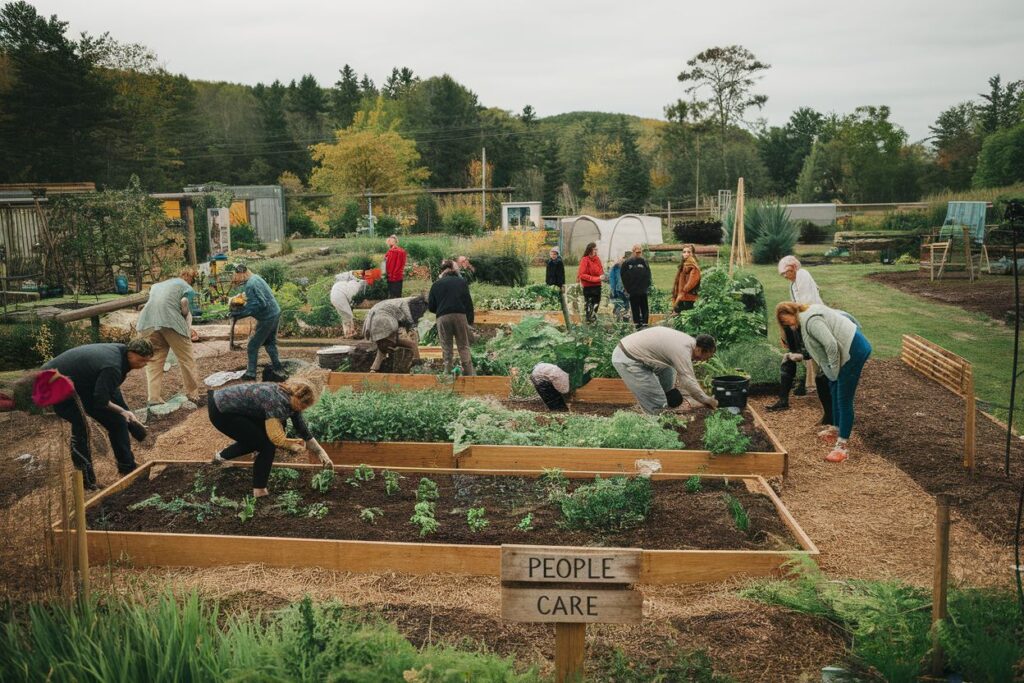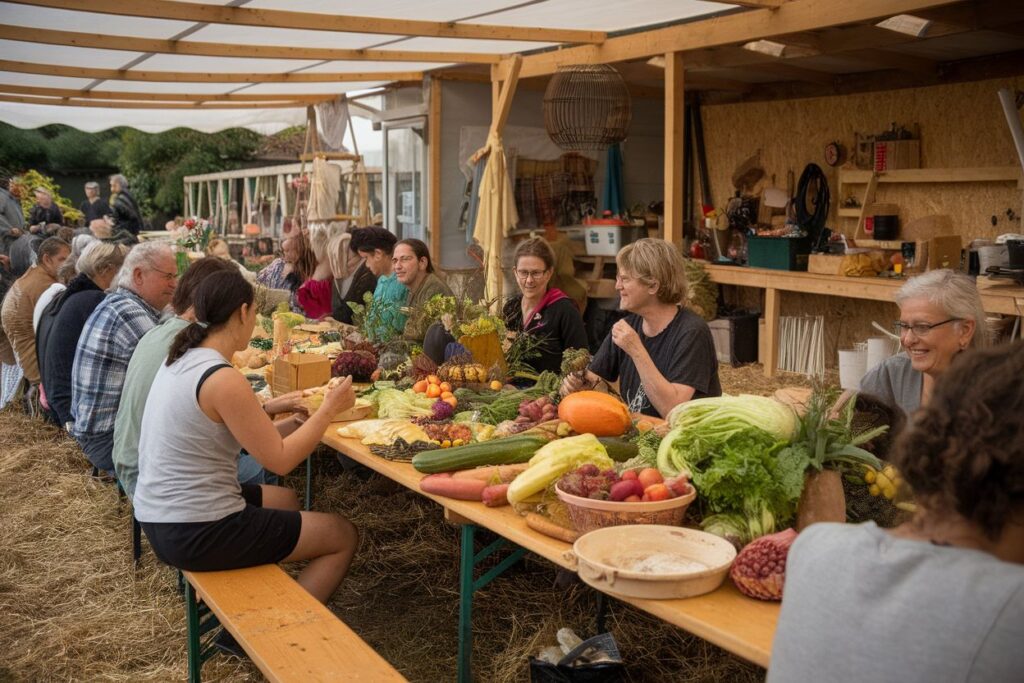Permaculture is a way of living that cares for the Earth and people. It has three main principles: Earth Care, People Care, and Fair Share. These principles help us live in harmony with nature.
Permaculture ethics are more than just ideas. They are a guide for creating sustainable systems. By following these principles, we can build a better future for our planet and all living things. We’ll see how these principles apply to our daily lives, like growing food and using energy wisely.
These ethics help us understand our connection to nature. By living by these principles, we can change our communities and homes. This leads to a more sustainable and fair world for everyone.
Understanding the Core Philosophy of Permaculture
The permaculture philosophy started in the 1970s by Bill Mollison and David Holmgren. They wanted a better way to design that was both sustainable and ethical. They believed that working with nature could help us create systems that are good for us and the planet.
Mollison and Holmgren created the core ethics of permaculture: earth care, people care, and fair share. These ethics are the base for sustainable design. They help permaculturists build communities that are self-sufficient and in balance with nature.
Over the years, these ethics have kept guiding the permaculture movement. They inspire people all over the world to live more consciously.
In permaculture, ethics are not just ideas; they drive sustainable design. By focusing on the earth and its people, permaculturists aim to make systems that waste less and work better. This approach is key to designing everything from gardens to renewable energy systems.
It ensures that each part works well with the whole. This is how permaculture creates harmony in design.
The permaculture philosophy is the base for many sustainable practices today. It influences everything from urban farming to natural building. The core principles of permaculture help people work towards a fair and green world.
As the world faces big challenges, permaculture’s ethical approach is more important than ever. It shows us how to live in a way that is good for everyone and the planet.
Earth Care: The First Ethical Principle
At the heart of permaculture is the Earth care principle. It guides us toward sustainable design and practice. This principle is key to preserving our ecosystem, boosting biodiversity, and improving soil health.
Permaculture teaches us that our planet’s health is tied to our own. By adopting regenerative practices, we build a strong bond with nature. We design gardens like natural ecosystems and manage waste in a holistic way.
Earth care shows us that our actions greatly affect our planet. Permaculture encourages us to see ourselves as part of the ecosystem, not separate. This mindset helps us make choices that protect and restore nature.
The Earth care principle is our guide in today’s world. It leads us toward living in harmony with nature. Through permaculture, we learn to value our connection with all living things. We aim to care for the land, water, and air that support us.
People Care: Building Sustainable Communities

At the heart of permaculture is the principle of “people care.” It focuses on building strong, thriving communities. By supporting local food and creating strong social bonds, permaculture helps lay the groundwork for sustainable living.
Developing local food systems is key in permaculture’s people care. It encourages community gardens and urban farms. This reduces our need for food from far away, making communities more resilient and connecting people to the land.
Permaculture also values building strong social structures. It involves creating shared spaces and workshops for skill-sharing. This helps build a community that is fair and self-reliant.
Education is at the core of permaculture’s people care. Practitioners share their knowledge to empower others. This exchange is vital for spreading permaculture’s principles far and wide.
Permaculture’s focus on people care offers a complete way to build sustainable communities. It supports local food, builds strong social bonds, and promotes education. Together, these efforts help create communities ready to face the 21st century’s challenges.
Fair Share: Distribution and Resource Management

Permaculture’s core is the “Fair Share” idea. It’s about sharing and managing resources fairly. This idea makes sure everyone gets what they need, including the environment.
The Fair Share principle promotes a circular economy. It aims to reduce waste and use resources wisely. This way, permaculture helps build a greener, stronger society.
These systems aim for fair resource sharing. This supports social justice and caring for the environment. It’s key for local food systems and sustainable projects that benefit people and the planet.
By following Fair Share, permaculture helps create a better future. It focuses on using resources well for everyone’s benefit and the planet’s health.
Practical Applications of Permaculture Ethics in Design
Permaculture is all about sustainable design. It brings ethics to life in many ways. This includes garden layouts, eco-friendly buildings, and smart waste management.
In permaculture gardens, earth care, people care, and fair share are key. Gardeners plan carefully to use resources well and boost biodiversity. They place plants and structures to save water and encourage nature to work together.
Permaculture ethics guide sustainable architecture too. Builders use natural light, air flow, and local materials. This approach makes buildings green, efficient, and in line with permaculture values.
These ethics lead to creative waste solutions. People aim for zero waste by composting and recycling. This helps the environment and follows permaculture’s fair share principle.
By applying permaculture ethics, we can build better, greener spaces. These places are good for the earth and for people.
Challenges in Implementing Permaculture Principles
Bringing permaculture’s ethical principles to life is tough. The idea of permaculture is to be sustainable, but permaculture adoption barriers and sustainability challenges make it hard to do so widely.
One big ethical dilemma is the gap between permaculture’s ideals and today’s economy. Switching to a permaculture way of life often means spending a lot of money upfront. This can stop many people and communities who are already struggling financially.
Also, changing society’s ways is hard. Old habits, cultural norms, and the usual ways of farming and development make it tough to adopt permaculture. To overcome these, we need to keep teaching, engaging with communities, and being ready to question the usual ways.
But, there are people working hard to solve these problems. They’re coming up with new ways to pay for permaculture, starting community projects, and working together to make permaculture part of everyday planning. By tackling these obstacles, the permaculture movement can grow and help make a better future for all.
The Future of Permaculture in Modern Society

As cities grow, urban permaculture offers solutions for sustainable cities. It helps create ecosystems that feed communities and fight climate change. By using permaculture in city planning, we can make cities better for everyone.
Urban gardens and rooftop farms turn cities into green spaces. They provide fresh food, clean air, and bring people together. These projects make cities healthier and more connected.
Permaculture helps cities deal with climate change. It builds strong, adaptable landscapes. This way, cities can handle extreme weather and drought better.
Permaculture’s economic benefits are huge. It helps cities use less outside resources and promotes local growth. This creates jobs and strengthens communities.
Permaculture, climate resilience, and sustainable economics are key for the future. They help us build a better world. A world that’s good for the planet, people, and the economy.
Final Thoughts
As we wrap up our look at permaculture’s ethics, it’s clear they’re crucial for a better future. The three main ethics—Earth Care, People Care, and Fair Share—form a solid base for living in harmony with nature and each other.
The Earth Care principle tells us to care for the natural world that supports us. People Care focuses on building strong, supportive communities and local food systems. Fair Share ensures resources are shared fairly, so everyone can live well.
By living these ethics, we can create a world that’s in sync with nature and values everyone’s well-being. Permaculture’s approach to living sustainably helps us build a future where nature, justice, and economic strength come together. This leads to a world that’s fair and regenerative for all.











